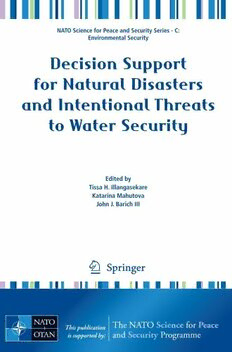
Decision Support for Natural Disasters and Intentional Threats to Water Security PDF
258 Pages·2009·24.19 MB·English
Most books are stored in the elastic cloud where traffic is expensive. For this reason, we have a limit on daily download.
Preview Decision Support for Natural Disasters and Intentional Threats to Water Security
Description:
These proceedings summarize the results of a NATO Advanced Research Workshop on water security. Multiple, disparate threats to water security exist. Decision support structures that provide effective means for avoiding and responding to potential or actual situations exist or are under development. Water resources are essential to security. A sufficient quantity of water of acceptable quality is needed to provide for health, welfare, and ecosystem integrity. The extremes of too much water, as with hurricanes, tsunamis or floods, or too little, as with droughts or over-exploitation, present water security concerns. The goal of the workshop was to explore the relationship of decision support and environmental informatics as complementary tools to improve water security. Objectives included the evaluation of “lessons learned” from recent natural disasters (hurricanes, tsunami, etc.) and the delineation of how the use of state-of-science tools improves water security in relation to natural disasters and intentional threats. These proceedings include papers on (1) catastrophic events like the 2004 South Asian tsunami, hurricane Katrina, and chronic threats of floods, (2) anthropogenic threats to water security (either intentional as in a terrorist threat or unintended as in an unwanted consequence of economic or cultural activity,) and (3) decision support tools.
See more
The list of books you might like
Most books are stored in the elastic cloud where traffic is expensive. For this reason, we have a limit on daily download.
